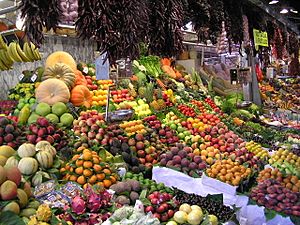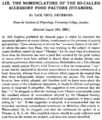Vitamin facts for kids
A "vitamin" is also a pill that contains vitamins, often taken to help you stay healthy.
A vitamin is a special chemical compound your human body needs. You only need a tiny bit of each vitamin, but they are super important for your body to work right. Some well-known vitamins include Vitamin A, many B vitamins (like B1, B2, B3, B6, and B12), Vitamin C, Vitamin D, Vitamin E, and Vitamin K. For example, citrus fruits like oranges and lemons are full of vitamin C.
The word "vitamin" was first used in 1912 by a scientist named Casimir Funk. He found these important tiny nutrients and suggested calling them "vitamines." The word "vitamin" usually doesn't include other important things your body needs, like certain minerals, essential fatty acids, or essential amino acids.
Today, we know about thirteen different vitamins. Vitamins are grouped by what they do in your body, not by their exact chemical shape. Each vitamin name (like "vitamin A") actually refers to several similar chemicals called vitamers. These vitamers all do the same job in your body. For example, vitamin A can be different chemicals that all act as vitamin A. Your body can even change some vitamers into the active form of the vitamin.
Your body usually cannot make these chemicals itself. You get them from other places, mostly from the food you eat. If you miss a vitamin for a short time, it's usually not a big problem. Your body can store some vitamins for a little while. But if you don't get a certain vitamin for a long time, it can lead to different diseases. The type of disease depends on which vitamin you are missing. One famous example is scurvy, which happens if you don't get enough Vitamin C. Other diseases caused by lack of vitamins include Beriberi and rickets.
Luckily, many drug companies now make affordable pills that contain various vitamins. These pills help people get the vitamins they need and avoid these diseases.
Vitamins are divided into two main types: fat-soluble and water-soluble.
- Fat-soluble vitamins (A, D, E, and K) can be stored in your body for later use.
- Water-soluble vitamins only stay in your body for a short time before being used or passed out.
Contents
How Vitamin Names Changed
You might notice there are no vitamins F to J today. These names were used at one point. However, scientists later found out that some of these were not true vitamins, or they were renamed. For example, some were later included in the B vitamins group. Today, the B vitamins are a whole group of different vitamins, not just one.
Scientists from Germany discovered and named vitamin K. They chose "K" because this vitamin is very important for 'Koagulation' (blood clotting) after an injury. At that time, most letters from F to I were already used, so K made sense.
Here is a list of some chemicals that were once called vitamins, or older names for vitamins now part of the B-complex:
| Old Name | New Name or Reason |
|---|---|
| Vitamin B4 | No longer a vitamin |
| Vitamin B8 | No longer a vitamin |
| Vitamin F | Now called Essential fatty acids (needed in larger amounts) |
| Vitamin G | Renamed Vitamin B2 |
| Vitamin H | Renamed Vitamin B7 (Biotin) |
| Vitamin J | No longer a vitamin |
| Vitamin L1 | No longer a vitamin |
| Vitamin L2 | No longer a vitamin |
| Vitamin M | Renamed Vitamin B9 (Folic acid) |
| Vitamin O | No longer a vitamin |
| Vitamin P | No longer a vitamin |
| Vitamin PP | Renamed Vitamin B3 (Niacin) |
| Vitamin U | No longer a vitamin |
Important Vitamins and Where to Find Them
Here is a list of the main vitamins, what they do if you don't get enough, and where you can find them in food.
| Vitamin Name | Type | What Happens if You Don't Get Enough | Good Food Sources |
|---|---|---|---|
| Vitamin A | Fat-soluble | Night blindness (trouble seeing in the dark) | Liver, orange and yellow fruits, leafy green vegetables, carrots, pumpkin, fish, milk |
| Vitamin B1 | Water-soluble | Beriberi (affects nerves and heart) | Pork, oatmeal, brown rice, vegetables, potatoes, liver, eggs |
| Vitamin B2 | Water-soluble | Cracks at the corners of your mouth, sore tongue | Dairy products, bananas, popcorn, green beans, asparagus |
| Vitamin B3 | Water-soluble | Pellagra (skin problems, digestion issues) | Meat, fish, eggs, many vegetables, mushrooms, nuts |
| Vitamin B5 | Water-soluble | Tingling or numbness (rare) | Meat, broccoli, avocados |
| Vitamin B6 | Water-soluble | Anemia (low red blood cells), nerve problems | Meat, vegetables, nuts, bananas |
| Vitamin B7 | Water-soluble | Skin rash, hair loss (rare) | Raw egg yolk, liver, peanuts, leafy green vegetables |
| Vitamin B9 | Water-soluble | Megaloblastic anemia (large red blood cells), important for healthy babies during pregnancy | Leafy vegetables, pasta, bread, cereal, liver |
| Vitamin B12 | Water-soluble | Pernicious anemia (tiredness, nerve damage) | Meat, poultry, fish, eggs, milk |
| Vitamin C | Water-soluble | Scurvy (tiredness, bleeding gums) | Many fruits and vegetables, liver |
| Vitamin D | Fat-soluble | Rickets (soft bones in children), osteomalacia (soft bones in adults) | Fish, eggs, liver, mushrooms |
| Vitamin E | Fat-soluble | Very rare, can affect red blood cells | Many fruits and vegetables, nuts and seeds |
| Vitamin K | Fat-soluble | Problems with blood clotting | Leafy green vegetables like spinach, egg yolks, liver |
Related pages
Images for kids
-
The Ancient Egyptians knew that eating liver could help with night blindness.
-
Jack Drummond’s article from 1920 that helped name and organize vitamins.
See also
 In Spanish: Vitamina para niños
In Spanish: Vitamina para niños





